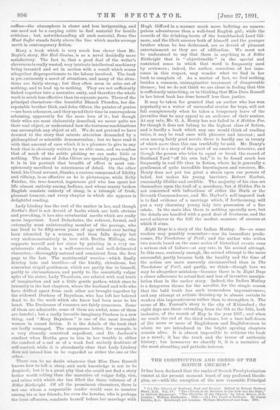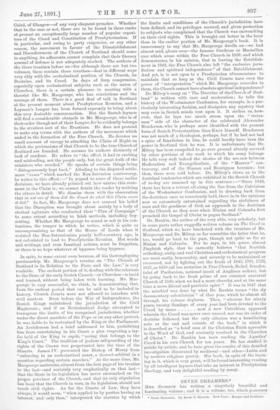THE CONSTITUTION AND CREED OP THE SCOTCH CHURCH.* IT has
been declared that the ranks of Scotch Presbyterianism cannot at the present moment boast of any profound theolo- gian, or—with the exception of the now venerable Principal
* (1.) The Church of &Oland., Past and Present. Edited by Robert Herbert Story, D,D, Vol. IV. "The Church in its Relation to the Law and the State," by Andrew Mnogeorgo. " The Doctrine of the Church," by Adam Milroy, B. 0. London William Mackenzie. 1891.--(2 ) The Creed In Scotland. By James Rankin, D.D. Edinburgh and Loisdon William Blackwood and Sons. 1891. Claird, of Glasgow—of any very eloquent preacher. Whether that be the case or not, there are to be found in these ranks at present an exceptionally large number of popular exposi- tors of the Creed and Constitution of Presbyterianism. If in particular, and owing to party exigencies, or any other reason, the movement in favour of the Disestablishment and Disendowment of the Church of Scotland should come to anything, its adherents cannot complain that their literary arsenal of defence is not adequately stocked. The authors of the three treatises before us—,for although there are but two volumes, these contain three treatises—deal in different ways very ably with the ecclesiastical position of the Church, its Doctrine, and its Creed. In days of limp compromise, especially upon ecclesiastical subjects such as the union of Churches, there is a certain pleasure in meeting with a theorist like Mr. Macgeorge, who has convictions and the courage of them. There is a good deal of talk in Scotland at the present moment about Presbyterian Reunion, and a Laymen's League has been formed expressly to bring about this very desirable consummation. But the Scotch laymen will find a considerable obstacle in Mr. Macgeorge, who is of their order though not of their League, for he evidently belongs to the straitest sect of the Erastians. He does not pretend to make any terms with the authors of the movement which -ended in the formation of the Free Church. He devotes no small amount of energy to attacking the Claim of Right on which the pretensions of that Church to be the true Church of Scotland are founded. He accuses its authors distinctly of lack of candour. He refers to "the effect it had in exciting and misleading, not the people only, but the great bulk of the ministers who seceded." He speaks of certain things being 'disingenuously kept back." Alluding to the disputed settle- ment " cases " which marked the Non-Intrusion controversy, he writes to this effect :—" In regard to some of these earlier decisions, we have already pointed out how untrue this state- ment in the Claim is ; we cannot detain the reader by noticing the others in detail. We dismiss them with the observation that in not one of them, did the Court do what this Claim, avers it did." In fact, Mr. Macgeorge does not conceal his belief that the Disruption was brought about mainly by a body of -clerical agitators who conducted their "Plan of Campaign" to some extent according to Irish methods, including boy- eotting. Whether Mr. Macgeorge be sound or not in his con- tentions, the temper in which he writes, which is quite as uncompromising as that of the House of Lords when it resisted the Non-Intrusionists nearly half-a-century ago, is not calculated to lead to Presbyterian Reunion. Hot words and writings, and even fanatical actions, must be forgotten, or there is no hope whatever of bygones being bygones.
In spite, to some extent even because, of his thoroughgoing partisanship, Mr. Macgeorge's treatise on "The Church of Scotland in its Relation to the State and the Law," is very readable. The earliest portion of it, dealing with the relations to the State of the early Scotch Church—or Churches—is lucid and learned, without being laden with learning. Mr. Mac- george is very successful, we think, in demonstrating that, from the earliest period that can be said to be included in history, Church Courts were not allowed to interfere with civil matters. Even before the War of Independence, the Scotch Kings maintained the jurisdiction of the Civil Magistrate ; and if an Ecclesiastical Judge attempted to transgress the limits of his recognised jurisdiction, whether under the direct mandate of the Pope or on any other pretext, he was liable to be restrained by the King or the Parliament. An Archdeacon had a brief addressed to him, prohibiting him from entertaining in his Court a plea respecting a lay- fee held of the King in capite, "seeing that belongs to the King's Court." The tradition of jealous safeguarding of the rights of the Crown was perpetuated into the time of the Stuarts. James IV. prevented the Bishop of Moray from 'enforcing in an ecclesiastical court, a deereet-rtrbitral in a question regarding certain marches." At the same time, Mr. Macgeorge maintains, almost from the first page of his treatise to the last—and certainly very emphatically on that let— that the State in its legislation has never encroached on the proper province of the Church, and that its only stipulation has been that the Church in turn, in its legislation, should not touch civil rights. As for the Courts of Law, they have always, it would seem, "when applied to by parties having an interest, and only then," interpreted the statutes by which
the limits and conditions of the Church's jurisdiction have been defined, and its privileges secured, and given protection to subjects who complained that the Church was encroaching on their civil rights. This is brought out better in the later than in the earlier portion of Mr. Macgeorge's book. It is unnecessary to say that Mr. Macgeorge dwells on—we had almost said, gloats over—the famous Cardross or Macmillan case which arose within the Free Church in 1859, and which demonstrates, in his opinion, that in leaving the Establish- ment in 1843, the Free Church also left "the exclusive juris- diction and spiritual independence" of that Establishment. And yet, is it not open to a Presbyterian ultramontane to maintain that so long as the Civil Courts have even the power of "interpretation" which Mr. Macgeorge concedes to them, the Church cannot have absolute spiritual independence P Dr. Milroy's essay on The Doctrine of the Churah of Scot- land" is written with care and moderation; he tells the history of the Westminster Confession, for example, in a par- ticularly interesting fashion, and dissipates any mystery that may even in Scotch minds rest upon it. It strikes us, how- ever, that he lays too much stress upon the " states- man " side of the character of the celebrated Alexander Henderson, who is perhaps more identified with the present form of Scotch Protestantism than Knox himself. Henderson was not much of a theologian, perhaps, but if he had not had a spice of fanaticism in him, he could hardly have been the power in Scotland that he was. It is unfortunate that Dr. Milroy has been compelled to go over ground already covered by other portions of the work to which his essay belongs. He tells very well indeed the stories of the see-saw between Moderatism and Evangelicalism, of the " Marrow " con- troversy, and of the Simeon and Bourignon heresies ; but then, these were told before. Dr. Milroy's views as to the doctrinal tendencies which are exhibited in the Scotch Church of to-day are summed up in this sentence :—" Since 1843, there has been a retreat all along the line from the Calvinism of the Westminster Confession, and in drawing back from the doctrines once so tenaciously held, there is, in the opinions now so extensively entertained regarding the sinfulness of man and the goodness of God, an approach to the doctrines of the Church as they were when Ninian and Columba first preached the Gospel of Christ to pagan Scotland."
Dr. Rankin, the author of the very able, very scholarly, but in some parts rather ruggedly written volume on The Creed in Scotland, which we have bracketed with the treatises of Mr. Macgeorge and Dr. Milroy, so far resembles the latter that he, too, would go back to the past, though not quite so far as Ninian and Columba. For he says, in his queer, almost Jingleish style, that he earnestly believes "that Scottish orthodoxy, unity, and real Christian and ecclesiastical progress are most easily, honourably, and securely to be maintained or recovered, not by fighting out the feuds of 1843, 1761, 1733, 1647, or 1610 (all too sectarian in Free Church, Relief, Seceder, taint of Puritanism, national insult of Anglican orders), but by going back to the fresh prime of our common ancestral Church of 1560, when we had a more churchy, and at the same time a more liberal and patriotic spirit." It was in 1647 that the mischief was done by what Dr. Rankin terms "the sly documentary substitution" of that year, which he almost all through his volume deplores. Then, "whereas for ninety years, twenty Sundays of every year had been devoted to the Creed by name now a new Catechism appeared wherein the Creed was never once named, nor was its order of doctrine followed, but the only allusion was a humiliating note at the end and outside of the book," in which it is described as " a brief sum of the Christian Faith agreeable to the Word of God, and anciently received in the Churches of Christ." Dr. Rankin has been reading the Apostles' Creed in his own Church for ten years. He has studied it article by article, and he here gives the results of this detailed investigation illustrated by mediwval—and other—Latin, and by modern religious poetry. His book, in spite of the learn- ing in it, which is very great, will be found interesting reading by all intelligent laymen that take an interest in Presbyterian theology, and very delightful reading by many.



































 Previous page
Previous page